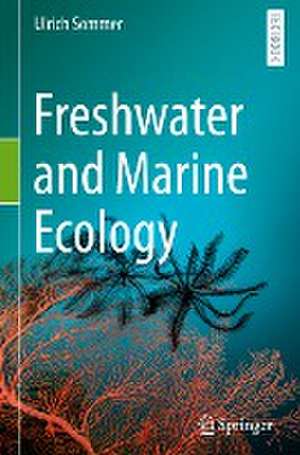Freshwater and Marine Ecology
Autor Ulrich Sommeren Limba Engleză Hardback – 2 feb 2024
Preț: 656.43 lei
Preț vechi: 772.26 lei
-15% Nou
Puncte Express: 985
Preț estimativ în valută:
125.65€ • 132.00$ • 105.59£
125.65€ • 132.00$ • 105.59£
Carte disponibilă
Livrare economică 18 februarie-04 martie
Preluare comenzi: 021 569.72.76
Specificații
ISBN-13: 9783031424588
ISBN-10: 3031424581
Pagini: 435
Ilustrații: XVI, 435 p. 160 illus., 112 illus. in color.
Dimensiuni: 155 x 235 x 28 mm
Greutate: 0.86 kg
Ediția:2023
Editura: Springer International Publishing
Colecția Springer
Locul publicării:Cham, Switzerland
ISBN-10: 3031424581
Pagini: 435
Ilustrații: XVI, 435 p. 160 illus., 112 illus. in color.
Dimensiuni: 155 x 235 x 28 mm
Greutate: 0.86 kg
Ediția:2023
Editura: Springer International Publishing
Colecția Springer
Locul publicării:Cham, Switzerland
Cuprins
Chapter 1. Introduction.- Chapter 2. The Aquatic Habitat.- Chapter 3. Life Forms of Aquatic Organisms.- Chapter 4. Ecophysiology.- Chapter 5. Populations.- Chapter 6. Interactions.- Chapter 7. Communities and Ecosystems.- Chapter 8. Biogeochemistry.- Chapter 9. Human Impacts.
Notă biografică
Ulrich Sommer is an ecologist with ample research experience in freshwater and marine ecology. He started his career at the Institute of Plant Physiology at the University of Vienna (Austria) where he received his doctorate in 1977. From 1979 to 1985 he was Assistant Professor at the Limnological Institute at the University of Constance, Germany. From 1985 to 1991 he worked as Senior Scientist at the Max-Planck-Institute of Limnology at Plön, Germany. In 1991 to 1994 he held a chair of Microbiology of Geological Processes at the Institute for Chemistry and Biology of Marine Systems (ICBM) at the University of Oldenburg. The move from Plön to Oldenburg was connected with a shift of his main focus from limnology to biological oceanography. In 1994 he became full professor of Marine Biology at the University of Kiel and the Institute for Marine Research (IFM) which later became part of the GEOMAR Helmholtz Centre for Ocean Research. He is author of ca. 250 peer-reviewed articles in international journals and several books: Plankton Ecology: Succession in Plankton Communities (1989), Planktologie (1994), Biologische Meereskunde (1st ed. 1998, 2nd ed. 2005) and together with Winfried Lampert Limnoecology (1st ed. 1997, 2nd ed. 2007) and together with Boris Worm Competition and Coexistence (2002). He is Editor-in-Chief of the international journal Marine Biology and Associate Editor of Oecologia and Aquatic Sciences.
Textul de pe ultima copertă
Freshwater and Marine Ecology is an introduction to the field of aquatic ecology, integrating the conceptually and methodologically widely overlapping fields of limnology and biological oceanography. It is structured like most textbooks of general ecology, leading from more elemental entities (individuals having to cope with their environment) to increasingly overarching entities, from populations over communities and ecosystems to the biogeochemistry of the entire planet and, finally, an overview over the major human impacts on the aquatic components of the earth system. The book provides examples for all major theoretical concepts of general ecology while the usual ecology textbooks have a strong terrestrial bias and rely only on few aquatic examples. This book takes the contrasting approach, motivated by the fact the fact that life originated from aquatic systems and that surface waters cover more than 70% of the Earth’s surface. The choice of studies used as examples in Freshwater and Marine Ecology provides a balanced mix of freshwater and marine studies, of field observations, experimental and modeling studies. The readers are confronted with very recent work leading to the forefront of contemporaneous research but also with classic studies which laid the foundations of theory development in the field. Freshwater and Marine Ecology is a comprehensive text ideally serving for undergraduate courses in biological oceanography, limnology, and ecology, but also for advanced students, teachers and scientists who had limited exposure to aquatic sciences and/or ecology during their studies.
Caracteristici
Provides an integrated introduction into the fields of limnology and biological oceanography Accessible introduction to all major concepts of ecology based on examples from freshwater and marine of aquatic systems Basis for understanding how the aquatic biosphere and its relationships to human affairs will change in the Anthropocene
